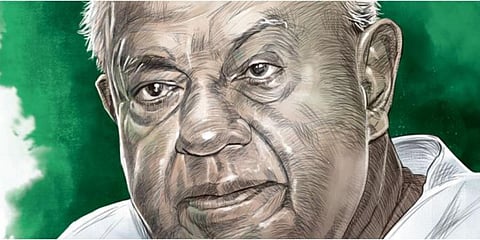

Earlier this week, the Kannada media went to town celebrating the silver jubilee of H D Deve Gowda taking oath as prime minister (1 June 1996). It was a retrospective moment of pride because 25 years ago, the local press that pretended to be torn between Gowda and Ramakrishna Hegde had quietly pushed the Hegde line on nearly all stories and, after Gowda had stepped down as prime minister 11 months later, had hastily written his political obituary.
Now, 17 years after Hegde’s death in 2004, when Gowda is still politically relevant, there seems to be a remorseless correction. With the distance of time and in the context of virulent nationalism, a new generation in Karnataka has learnt to reconstruct regional pride and posit sub-nationalism in a different manner. Gowda has become one of its symbols. He has also become an alternative to the hubris of all that is national (read national parties), because he is presented as an epitome of the federal idea. An excessive centralisation of governance in the last seven years has added lustre to his rediscovery.
Anyway, despite reams of newsprint and airtime celebrating Gowda, there may be a few larger things that need to be placed in perspective. What needs to be told right up is that Gowda was not an ‘accidental’ prime minister. He was part of our political system for over four decades by the time he came to occupy the highest office in the nation. He had been everything by then, from a taluk board member to MLA and opposition leader to minister and chief minister, when he was chosen to head the United Front coalition government. Except for those who are born to the Nehru-Gandhi dynasty, none can assume growing up that they are born to be prime ministers. The others can aspire but cannot assume that the chair is meant exclusively for them. Therefore, anybody who has become or becomes a prime minister in our parliamentary system is indeed an accidental prime minister.
This holds true for Lal Bahadur Shastri, another prime minister who was sworn in 57 years ago, again in June. From many published accounts, he was not a frontrunner. Interim prime minister Gulzarilal Nanda, Morarji Desai and Indira Gandhi were the options before the Congress party. Desai, it is said, was preferred by the right wing of the Congress and by leaders like Biju Patnaik, D Sanjeevayya, Jagjivan Ram and Mohanlal Sukhadia. The left wing of the party tried to push Indira Gandhi’s name. Shastri belonged to neither camp but was favoured by the powerful syndicate, which K Kamaraj, the Congress president, controlled. Therefore, Shastri was as accidental a prime minister as Gowda.
Later, Morarji Desai in 1977, V P Singh, Chandra Shekhar, I K Gujral, P V Narasimha Rao, A B Vajpayee (who was preferred over L K Advani) and Manmohan Singh (who took Sonia Gandhi’s place) were all accidental prime ministers. Gowda, who led the largest contingent of MPs after the Left parties, had been democratically chosen after V P Singh and Jyoti Basu declined the post. Until Narendra Modi and the BJP converted the prime ministerial selection process into a presidential contest in 2013-14, which placed the individual over the party, most of the prime ministers in our parliamentary system were accidental.
Before Gowda, Morarji Desai, V P Singh and Narasimha Rao too had been chief ministers. In fact, Gowda had greater grassroots experience than all of them put together and that distinguished him as a prime minister because he was instantly able to connect with the problems of India. From this point of view, he was eligible to be prime minister as much as anybody else. He was very involved and empathetic in the chair and the access that he gave to not just his ministers, politicians and partymen, but also to ordinary people, was extraordinary. His Janata Darshans were well known. This urge to be in direct physical contact with people was the nature of his mass politics. Now, it has been substituted by virtual social media accounts, and mass politics has been substituted by a majoritarian one.
Many prime ministers have preferred to rule through coteries, kitchen cabinets, technocrats and a select bunch of officers. For instance, Indira Gandhi ruled through her coteries that changed from time to time. She was seen by her sycophantic partymen as an ‘empress’, so the distance and the connect was that limited or cut off. Gowda too had a dedicated team of officers led by the likes of Satish Chandran and T S R Subramanian; he had a bunch of experts always advising him; he himself was a qualified engineer; but he never adopted a technocratic governance model. He always preferred to be an interface between the people and his officers and experts. He followed the Nehruvian model here. The technocratic model that we have been witness to since 2014, which bypasses the political process and the Cabinet, does not help the cause of democracy.
When Gowda became prime minister, it was a celebration of our democracy. If a complete outsider to the Delhi establishment like him could occupy the chair, it created hope. Many people intuitively understood that our democracy had not been rigged or captured by elites and dynasts, and there was indeed space in our political system to rise. No other prime minister had been able to give this assurance to the common man in India. Nehru, Indira and Rajiv were elites. Shastri, Charan Singh, V P Singh, Chandra Shekhar and Vajpayee were from the Hindi heartland. Morarji and Rao were upper caste men who had become part of the Delhi establishment for decades. Except for Charan Singh, who was a Jat and an Arya Samajist, Gowda was India’s first Shudra prime minister who faced Parliament. This should also largely explain the kind of resistance and hostility he faced despite the work he was able to accomplish in a short period.
Sugata Srinivasaraju
Senior journalist and author
(sugataraju@gmail.com)